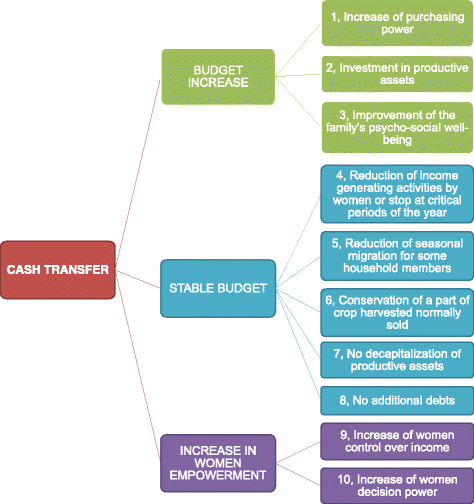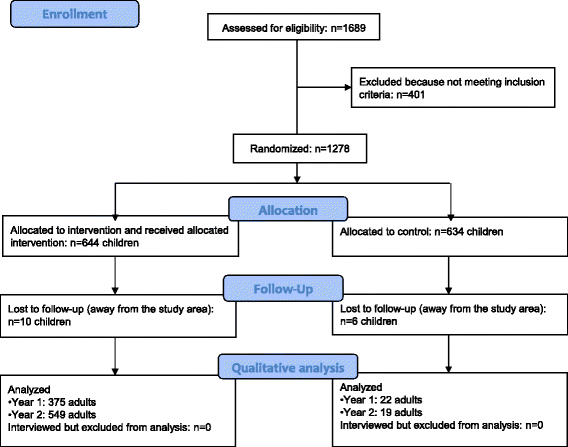Beneficiaries' perceptions and reported use of unconditional cash transfers intended to prevent acute malnutrition in children in poor rural communities in Burkina Faso: qualitative results from the MAM'Out randomized controlled trial
- PMID: 28558709
- PMCID: PMC5450256
- DOI: 10.1186/s12889-017-4453-y
Beneficiaries' perceptions and reported use of unconditional cash transfers intended to prevent acute malnutrition in children in poor rural communities in Burkina Faso: qualitative results from the MAM'Out randomized controlled trial
Abstract
Background: Acute malnutrition is a public health issue worldwide, and particularly in the Eastern region of Burkina Faso. Following a needs assessment, unconditional seasonal, multiannual cash transfers were implemented as a safety net to prevent childhood undernutrition. The objectives of this study were to explore the types of purchases made by beneficiaries of this cash transfer program and to understand the perceived effects of and changes induced by regular cash transfers in the daily lives of women, and at the household and community level.
Methods: The design of this study was a two-arm cluster randomized controlled trial. Qualitative data were collected each month during the cash transfer period for two years, leading to a total of more than 300 interviews and focus group discussions with various participants: beneficiary mothers, heads of households, mothers-in-law, co-wives, key members of the community, and participants of the control group.
Results: The two main types of expenses reported were food and health care for the child and the whole family. The program was also associated with positive perceived changes at the household level, mainly related to gender equality and improvement of women's status, and has promoted an increase in dignity and social integration of the poorest at the community level through cash sharing. Unexpected effects of this program included some women planning new pregnancies and some individuals not expecting the transfers to end.
Conclusion: Although the transfers were unconditional, the cash was mainly used to improve the children's and households' food security and health, which correspond to two main underlying causes of undernutrition. Therefore, spending mainly in these areas can help to prevent undernutrition in children.
Trial registration: ClinicalTrials.gov , identifier: NCT01866124 , registered May 7, 2013.
Keywords: Acute malnutrition; Burkina Faso; Children; Perceived changes; Unconditional cash transfer; Women.
Figures
References
-
- Tonguet-Papucci A, Huybregts L, Ait Aissa M, Huneau JF, Kolsteren P. The MAM'Out project: a randomized controlled trial to assess multiannual and seasonal cash transfers for the prevention of acute malnutrition in children under 36 months in Burkina Faso. BMC Public Health. 2015;15:762. doi: 10.1186/s12889-015-2060-3. - DOI - PMC - PubMed
-
- UNDP . Human development report 2014 - sustaining human progress: reducing vulnerabilities and building resilience - Burkina Faso. 2014.
-
- Ministère de la Santé - Direction de la Nutrition: Enquête nutritionnelle nationale 2011. 2011.
-
- Nikiema LO-: Evaluation de la situation nutritionnelle des enfants de 6 à 59 mois dans le district sanitaire de Diapaga: enquête SMART du 25 avril au 10 mai 2012. Action Contre la Faim 2012.
-
- Cartry M. Claris, lignages et groupements familiaux chez les Gourmantché de la région de Diapaga. L'Homme 1966, tome 6(n°2):53–81.
Publication types
MeSH terms
Associated data
Grants and funding
LinkOut - more resources
Full Text Sources
Other Literature Sources
Medical



